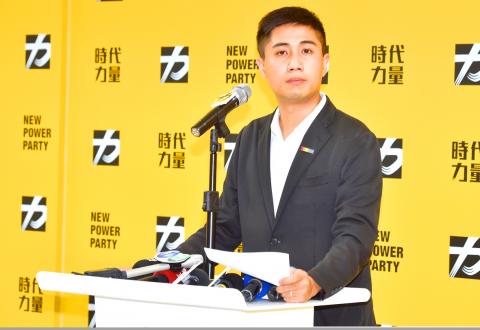The New Power Party (NPP) yesterday said it would transfer an alleged conflict of interest case involving NPP Legislator Kawlo Iyun Pacidal to the Legislative Yuan’s Discipline Committee for investigation following accusations that she abused her power to obtain government subsidies totaling NT$4 million (US$128,721).
The Green Party Taiwan on Monday said that two non-governmental organizations run by Kawlo’s assistant had received NT$4 million in subsidies from the Ministry of Economic Affairs.
The two groups — the Taiwan Association for Indigenous Peoples and Taiwan Associations for Startups and Marketing Centers — were among 19 organizations that in January received ministry subsidies to establish “clean” energy facilities.

Photo: Tu Chien-jung, Taipei Times
Both groups were established by the former director of Kawlo’s office, Chen Shih-chang (陳士章), and are currently managed by her office assistant, Chen En-tse (陳恩澤), the Green Party said on Facebook.
Despite having no former achievements, the two groups each received the maximum subsidy of NT$2 million, it said.
As Kawlo is a member of the Legislative Yuan’s Economics Committee, which is responsible for supervising the ministry, the Green Party accused her assistant of breaching the Act on Recusal of Public Servants Due to Conflicts of Interest (公職人員利益衝突迴避法) by applying for the ministry program.
Article 14 of the act bans public servants and people closely related to them from receiving subsidies from or engaging in monetary transactions with government agencies or organizations under their supervision, it said.
In cases involving an open bidding process, the act requires the bidding public servant, or people related to them, to disclose their identity or connection to the public servant to avoid a conflict of interest, it said.
“When the applicant is a legislator’s office assistant, would the ministry dare give them anything less than the maximum amount? The key question is whether Kawlo exerted pressure on the ministry,” the Green Party said.
Kawlo on Monday denied abusing her power to obtain any subsidies, saying: “The untrue accusations have undermined the reputation of the NPP and myself.”
The subsidies were applied “according to law,” as the act’s provision requiring bidders to disclose their connection to public servants had not yet gone into effect when he applied, Chen En-tse said in a statement yesterday.
The ministry’s Bureau of Energy confirmed that Chen had applied for the subsidies without disclosing his connection to the legislator, and that he applied months before the provisions came into effect in December last year.
The ministry would consult with the Ministry of Justice to determine whether the amendment should apply to the case, it added.
The NPP found evidence that Kawlo’s assistant applied for the subsidy and that Kawlo breached provisions regarding conflict of interest in the Legislators’ Conduct Act (立法委員行為法), the NPP said yesterday after an internal disciplinary meeting.
The committee was unable to reach Kawlo, but told her to offer an explanation on the case by 5pm today, it said, adding that if she does not give an explanation by then, the committee would make a decision without consulting her.
If Kawlo is found to have contravened the law, “in the most severe case, the NPP would require her to resign as legislator and would remove her from the NPP’s decisionmaking committee,” party spokesman Lee Chao-li (李兆立) said.

Alain Robert, known as the "French Spider-Man," praised Alex Honnold as exceptionally well-prepared after the US climber completed a free solo ascent of Taipei 101 yesterday. Robert said Honnold's ascent of the 508m-tall skyscraper in just more than one-and-a-half hours without using safety ropes or equipment was a remarkable achievement. "This is my life," he said in an interview conducted in French, adding that he liked the feeling of being "on the edge of danger." The 63-year-old Frenchman climbed Taipei 101 using ropes in December 2004, taking about four hours to reach the top. On a one-to-10 scale of difficulty, Robert said Taipei 101

Taiwanese and US defense groups are collaborating to introduce deployable, semi-autonomous manufacturing systems for drones and components in a boost to the nation’s supply chain resilience. Taiwan’s G-Tech Optroelectronics Corp subsidiary GTOC and the US’ Aerkomm Inc on Friday announced an agreement with fellow US-based Firestorm Lab to adopt the latter’s xCell, a technology featuring 3D printers fitted in 6.1m container units. The systems enable aerial platforms and parts to be produced in high volumes from dispersed nodes capable of rapid redeployment, to minimize the risk of enemy strikes and to meet field requirements, they said. Firestorm chief technology officer Ian Muceus said

MORE FALL: An investigation into one of Xi’s key cronies, part of a broader ‘anti-corruption’ drive, indicates that he might have a deep distrust in the military, an expert said China’s latest military purge underscores systemic risks in its shift from collective leadership to sole rule under Chinese President Xi Jinping (習近平), and could disrupt its chain of command and military capabilities, a national security official said yesterday. If decisionmaking within the Chinese Communist Party has become “irrational” under one-man rule, the Taiwan Strait and the regional situation must be approached with extreme caution, given unforeseen risks, they added. The anonymous official made the remarks as China’s Central Military Commission Vice Chairman Zhang Youxia (張又俠) and Joint Staff Department Chief of Staff Liu Zhenli (劉振立) were reportedly being investigated for suspected “serious

American climber Alex Honnold is to attempt a free climb of Taipei 101 today at 9am, with traffic closures around the skyscraper. To accommodate the climb attempt and filming, the Taipei Department of Transportation said traffic controls would be enforced around the Taipei 101 area. If weather conditions delay the climb, the restrictions would be pushed back to tomorrow. Traffic controls would be in place today from 7am to 11am around the Taipei 101 area, the department said. Songzhi Road would be fully closed in both directions between Songlian Road and Xinyi Road Sec 5, it said, adding that bidirectional traffic controls would